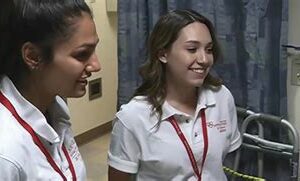Table of Contents
Discover the benefits of participating in hospital student volunteer programs. Gain valuable hands-on experience in a medical setting, learn from healthcare professionals, and contribute to patient care. Enhance your skills, build your resume, and make a difference in the lives of others. Find opportunities to volunteer at hospitals near you and explore various medical fields.
Hospital student volunteer programs offer valuable opportunities for aspiring healthcare professionals to gain hands-on experience and make a difference in their communities. With the chance to observe and assist medical personnel, students can immerse themselves in the fast-paced world of healthcare. Moreover, these programs provide a unique platform for enhancing interpersonal skills, as volunteers interact with patients from diverse backgrounds and build empathy and compassion. In addition, participating in such programs allows students to develop a sense of responsibility and professionalism, preparing them for future careers in the medical field. Overall, hospital student volunteer programs offer an invaluable stepping stone for those looking to pursue a career in healthcare, providing a wealth of experiences and skill-building opportunities along the way.
Introduction
In recent years, hospital student volunteer programs have gained immense popularity among young individuals aspiring to pursue careers in the medical field. These programs provide an incredible opportunity for students to gain practical experience, develop essential skills, and contribute to their communities. By volunteering at hospitals, students not only offer valuable support to healthcare professionals but also get a firsthand glimpse into the intricacies of patient care. In this article, we will explore the benefits and significance of hospital student volunteer programs.
Hands-On Learning Experience
One of the primary advantages of participating in hospital student volunteer programs is the hands-on learning experience they offer. Students get the chance to observe medical procedures, interact with patients, and assist healthcare professionals in various tasks. This immersive environment allows them to apply theoretical knowledge acquired in classrooms to real-life situations, fostering a deeper understanding of medical practices.
Developing Empathy and Compassion
Hospital student volunteer programs provide a unique opportunity for students to develop empathy and compassion towards patients. By witnessing the challenges and struggles faced by individuals seeking medical care, students gain a greater appreciation for the importance of providing emotional support alongside medical treatment. This experience helps shape their future interactions with patients and enhances their ability to provide holistic care.
Building Communication Skills
Effective communication is an essential skill in healthcare, and hospital student volunteer programs offer an ideal platform for students to strengthen their communication abilities. Regular interactions with patients, families, and healthcare professionals allow students to practice active listening, articulating thoughts clearly, and conveying empathy. These experiences enable them to become better communicators, which is invaluable in any medical profession.
Exposure to Various Specialties
Hospital student volunteer programs often expose participants to a wide range of medical specialties. From pediatrics to geriatrics, emergency medicine to surgical units, students get a chance to explore different areas of healthcare. This exposure helps them make informed decisions about their future career paths, ensuring they choose a field that aligns with their interests and passions.
Networking Opportunities
Volunteering at hospitals also presents invaluable networking opportunities. Students often interact with healthcare professionals, including doctors, nurses, and administrators, who can provide mentorship and guidance. Building connections during these volunteer programs may open doors for future internships, research opportunities, or even job offers, as these professionals become familiar with the student’s dedication and work ethic.
Contributing to the Community
Hospital student volunteer programs allow students to make a meaningful contribution to their communities. By dedicating their time and efforts to support healthcare professionals, students play an essential role in improving patient experiences. Whether it’s providing companionship to elderly patients or offering a comforting presence to children undergoing treatment, their contributions have a positive impact on the overall well-being of the community.
Enhancing Personal Growth
Beyond the medical knowledge and skills gained, hospital student volunteer programs contribute significantly to personal growth. Students often develop resilience, adaptability, and problem-solving abilities while navigating the dynamic hospital environment. They also learn to manage their time effectively, juggling volunteer responsibilities with academic commitments. These experiences help shape well-rounded individuals who are prepared to tackle challenges in their future careers.
Inspiring Career Paths
For many students, hospital volunteer programs serve as a catalyst for their future career paths. The exposure to different medical specialties, the interactions with healthcare professionals, and the direct patient care experiences often ignite a passion for medicine or other healthcare-related fields. Students inspired by these programs are more likely to pursue higher education and training to fulfill their aspirations of becoming doctors, nurses, therapists, or other vital healthcare providers.
Conclusion
Hospital student volunteer programs offer immense benefits to aspiring medical professionals. From hands-on learning experiences and developing essential skills to contributing to the community and inspiring future careers, these programs provide a platform for personal and professional growth. By actively participating in such programs, students not only broaden their understanding of the medical field but also contribute to the well-being of patients and communities at large.
The Importance of Hospital Student Volunteer Programs in Healthcare Education
Hospital student volunteer programs play a vital role in fostering empathy, compassion, and understanding among aspiring healthcare professionals. These programs provide students with invaluable hands-on experience in hospital settings, allowing them to develop a deeper appreciation for patient care and the importance of effective communication and teamwork. Through these volunteer programs, students are given the opportunity to observe healthcare practices, work closely with experienced healthcare professionals, and contribute to enhancing the overall patient experience.
Benefits for Students Participating in Hospital Volunteer Programs
Engaging in hospital volunteer programs offers countless benefits for students. Firstly, it exposes them to various healthcare specialties, helping them gain a better understanding of the diverse career options within the field. Additionally, by interacting with healthcare professionals, students have the chance to clarify their career goals and narrow down their areas of interest. Furthermore, volunteering allows students to expand their skillset, including communication, problem-solving, and time management skills.
Enhanced Patient Experience through Student Volunteers
Hospital student volunteer programs contribute to improving the overall patient experience by offering students the opportunity to provide companionship and emotional support. Volunteers play a crucial role in alleviating patients’ fear and anxiety by offering a friendly face, a listening ear, or simply spending quality time with them. The presence of student volunteers in hospitals helps create a warm and welcoming environment, ultimately enhancing the patients’ overall well-being and satisfaction.
Collaboration between Students and Healthcare Professionals
Hospital student volunteer programs encourage collaboration between aspiring healthcare professionals and experienced medical personnel. Through teamwork and mentorship, students gain exposure to the day-to-day challenges faced by healthcare professionals, allowing them to develop essential skills necessary for their future careers. This collaboration fosters a sense of community and nurtures a supportive learning environment, benefiting both the students and the healthcare professionals involved.
Promoting Diversity and Inclusion in Healthcare Education
Hospital student volunteer programs have the potential to promote diversity and inclusion within the healthcare field. These programs provide opportunities for students from different backgrounds to engage with a range of patients, helping them develop a better understanding of cultural sensitivity and acquire insights into the unique healthcare needs of various communities. This exposure helps foster an inclusive mindset, preparing students to navigate the multicultural society that is inherent in the healthcare profession.
Volunteer Programs as a Gateway to Future Healthcare Careers
Hospital student volunteer programs often serve as a gateway for future healthcare careers. By volunteering, students can explore different specialties, gain exposure to various healthcare disciplines, and solidify their decision to pursue a specific career path. With the increasing competitiveness of healthcare education, participating in volunteer programs can give aspiring students a significant advantage in the admissions process.
Developing Lifelong Commitment to Community Service
Hospital student volunteer programs inspire students to develop a lifelong commitment to community service and instill a sense of social responsibility in them. Through volunteering, students learn the value of giving back to their communities and the impact of their actions on the lives of others. Many former hospital volunteers continue to engage in volunteer work throughout their careers, becoming advocates for their communities and making a significant impact on healthcare accessibility and equity.
The Future of Hospital Student Volunteer Programs
As the healthcare industry continues to evolve, hospital student volunteer programs will play an increasingly important role in shaping the next generation of healthcare professionals. The incorporation of technology and virtual volunteering opportunities allows for greater flexibility and accessibility, opening doors for students to gain experience from anywhere in the world. It is essential to continue expanding and improving these programs to ensure that future healthcare professionals receive the support and guidance needed to provide exceptional care to patients and make a lasting impact in the field.
Point of view: Hospital Student Volunteer Programs
1. Introduction
In recent years, hospital student volunteer programs have gained significant popularity across the country. These programs offer students a unique opportunity to gain firsthand experience in the healthcare field while also making a positive impact on the lives of patients. However, it is essential to critically analyze the benefits and limitations of such programs to understand their true value.
2. Benefits of Hospital Student Volunteer Programs
– Exposure to the healthcare field: Hospital student volunteer programs provide an excellent platform for students to explore various healthcare professions. By interacting with doctors, nurses, and other medical professionals, students can gain valuable insights into different career paths within the industry.
– Skill development: Through these programs, students can develop essential skills such as communication, empathy, teamwork, and problem-solving. These skills are not only crucial for success in the healthcare field but also transferable to various other professions.
– Networking opportunities: Volunteering in a hospital setting allows students to build connections with experienced professionals who can serve as mentors or provide guidance for future academic and career endeavors.
– Personal growth: Witnessing the challenges and triumphs of patients in a hospital environment can significantly contribute to the personal growth of student volunteers. It helps foster qualities like compassion, resilience, and adaptability, which are vital for any individual’s development.
3. Limitations of Hospital Student Volunteer Programs
– Limited scope of responsibilities: Due to legal and safety concerns, student volunteers are often restricted to performing only non-clinical tasks. While this ensures their safety and well-being, it may limit their exposure to certain aspects of healthcare and prevent them from fully understanding the realities of the profession.
– Inconsistent supervision and training: Not all hospital student volunteer programs provide consistent supervision and structured training. This can lead to inconsistencies in the quality of the volunteer experience and hinder the overall impact of the program.
– Emotional challenges: Witnessing patients’ suffering and dealing with emotional situations can be emotionally taxing for student volunteers. Without proper support systems in place, this can potentially have negative consequences on their mental well-being.
4. Conclusion
Hospital student volunteer programs offer students a unique opportunity to gain valuable insights into the healthcare field while making a positive impact on patients’ lives. Despite their limitations, these programs can provide a solid foundation for students considering a career in healthcare or any other profession that requires strong interpersonal skills. It is crucial for institutions offering such programs to provide adequate supervision, training, and emotional support to ensure a meaningful and rewarding experience for all involved.
Thank you for taking the time to explore the fascinating world of Hospital Student Volunteer Programs with us today. We hope that this article has provided you with valuable insights into the numerous benefits of participating in such programs. Whether you are a student considering a future career in healthcare or simply someone looking to give back to your community, these programs offer a unique opportunity for personal growth and meaningful contribution.
Firstly, let’s discuss the advantages of participating in a Hospital Student Volunteer Program. Such programs provide students with a chance to gain hands-on experience in a healthcare setting, allowing them to witness firsthand the daily challenges and rewards of working in this noble profession. By volunteering at a hospital, students can learn about various medical specialties, observe healthcare professionals in action, and even assist in basic patient care. This exposure not only helps students make informed decisions about their future career paths but also enhances their empathy, communication skills, and ability to work in a team.
Furthermore, participating in a Hospital Student Volunteer Program can significantly boost one’s college and job applications. Admissions officers and employers highly value volunteer work, as it demonstrates a candidate’s commitment to helping others and willingness to go beyond their academic requirements. The experiences gained through volunteering in a hospital setting can set individuals apart from their peers and make them stand out in a competitive pool of applicants. Additionally, volunteer programs often provide opportunities for networking, enabling students to connect with professionals in the healthcare field who can serve as mentors or provide valuable recommendations for future endeavors.
In conclusion, Hospital Student Volunteer Programs are an excellent way for students to explore their passion for healthcare while making a positive impact on the lives of patients and their families. The hands-on experience, personal growth, and networking opportunities offered by these programs are invaluable in shaping a successful future in the healthcare industry. If you’re a student considering a career in healthcare or simply looking for a meaningful way to give back to your community, we encourage you to explore the various Hospital Student Volunteer Programs available in your area. The rewards are not only felt by those you help but also by yourself as you grow both personally and professionally.
.
People Also Ask about Hospital Student Volunteer Programs:
1. How can I become a student volunteer at a hospital?
2. What are the benefits of participating in a hospital student volunteer program?
3. Are there any age restrictions for hospital student volunteer programs?
4. What kind of tasks will I be assigned as a student volunteer in a hospital?
5. Will I receive any training before starting my volunteer work at a hospital?
Answer:
- How can I become a student volunteer at a hospital?
- What are the benefits of participating in a hospital student volunteer program?
- Are there any age restrictions for hospital student volunteer programs?
- What kind of tasks will I be assigned as a student volunteer in a hospital?
- Will I receive any training before starting my volunteer work at a hospital?
To become a student volunteer at a hospital, you can start by contacting the volunteer services department of the hospital you are interested in. They will provide you with information on their specific requirements and application process. Generally, you will need to fill out an application form, provide references, and possibly undergo an interview. It is important to demonstrate your motivation, commitment, and genuine interest in helping others when applying.
Participating in a hospital student volunteer program offers numerous benefits. Firstly, it provides valuable hands-on experience in a healthcare setting, allowing you to explore potential career paths or gain insight into the medical field. Additionally, volunteering at a hospital allows you to make a positive impact on the lives of patients and their families, fostering a sense of fulfillment and personal growth. Moreover, it provides an opportunity to develop important skills such as communication, empathy, and teamwork.
Age restrictions for hospital student volunteer programs may vary depending on the hospital and local regulations. Some hospitals may accept volunteers as young as 14 or 15, while others may require volunteers to be at least 16 or 18 years old. It is important to check with the specific hospital’s volunteer services department to determine their age requirements.
As a student volunteer in a hospital, you may be assigned a variety of tasks based on your skills, interests, and the needs of the hospital. These can include providing assistance to nurses and doctors, delivering items to patients, supporting administrative staff, assisting with recreational activities for patients, or even helping with fundraising events. Your role may also involve interacting with patients, offering companionship, or providing comfort during their hospital stay. However, it is important to note that as a student volunteer, you will not be involved in any medical procedures or interventions.
Yes, before starting your volunteer work at a hospital, you will typically receive training to ensure you are well-prepared for your role. This training may cover topics such as hospital policies and protocols, patient confidentiality, infection control measures, communication skills, and basic first aid. Additionally, you may receive specific instructions on how to handle different situations or interact with patients and their families. The hospital will make sure you have the necessary knowledge and skills to carry out your volunteer duties safely and effectively.






